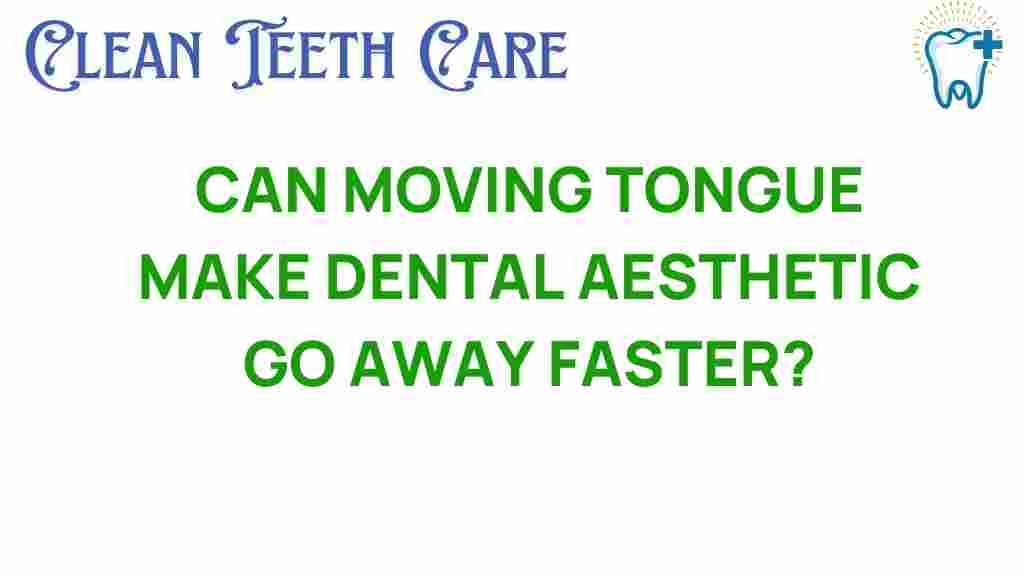Can Tongue Movement Accelerate Dental Aesthetics Recovery?
When it comes to dental aesthetics, many individuals are eager to achieve a beautiful smile while ensuring optimal oral health. One question that often arises is whether tongue movement can play a role in accelerating recovery after treatments such as braces or other orthodontic procedures. In this article, we will explore the relationship between tongue movement and dental aesthetics recovery, offering insights into how this simple action may impact healing and overall dental care.
The Importance of Tongue Movement in Oral Health
The tongue is a powerful muscle that plays a pivotal role in various functions, including:
- Eating: The tongue helps in manipulating food for chewing and swallowing.
- Speaking: It is essential for articulation and forming words.
- Cleaning: The tongue aids in maintaining oral hygiene by helping to remove food particles and bacteria.
Given its importance, many dental professionals believe that tongue movement can also influence recovery after dental treatments. This influence can manifest in various ways, particularly during orthodontic treatments such as braces.
How Tongue Movement Affects Orthodontic Recovery
When undergoing orthodontic treatment, such as wearing braces, the positioning and movement of the tongue can have significant effects on recovery:
- Pressure Distribution: The tongue exerts pressure on teeth and can help guide them into their desired positions, potentially speeding up the alignment process.
- Stimulation of Healing: Gentle tongue movements may promote blood circulation in the gums, which can lead to enhanced healing after adjustments or dental procedures.
- Maintaining Oral Hygiene: Regular tongue movement can help clean the mouth and prevent plaque buildup around braces, aiding in overall oral health.
Step-by-Step Guide to Utilizing Tongue Movement for Faster Recovery
Here’s a practical approach to harnessing the benefits of tongue movement during your orthodontic journey:
Step 1: Awareness of Tongue Position
Pay attention to where your tongue rests naturally. Ideally, it should be against the roof of your mouth when at rest. This position can help support proper dental alignment.
Step 2: Gentle Tongue Exercises
Incorporate simple tongue exercises into your daily routine:
- Rolling: Try rolling your tongue in different directions to enhance muscle flexibility.
- Stretching: Gently stretch your tongue as far as possible in and out of your mouth.
- Side to Side Movement: Move your tongue side to side, making sure to reach the corners of your mouth.
Step 3: Maintain Consistent Oral Hygiene
Incorporate tongue cleaning into your oral care routine:
- Brush your tongue: Use a toothbrush or a tongue scraper to remove bacteria and food particles.
- Stay Hydrated: Drink plenty of water to help keep your mouth moist and aid in healing.
Step 4: Communicate with Your Orthodontist
Always consult with your orthodontist about your tongue movements and any exercises you plan to incorporate. They can provide tailored advice based on your specific treatment plan.
Troubleshooting Common Concerns
While incorporating tongue movement into your recovery routine is generally beneficial, there may be concerns that arise. Here are some common issues and how to address them:
Issue 1: Discomfort or Pain
If you experience discomfort while performing tongue exercises, consider the following:
- Reduce the intensity or duration of the exercises.
- Consult your orthodontist to ensure that your treatment plan is progressing as expected.
Issue 2: Difficulty Maintaining Hygiene
Braces can make oral hygiene challenging. To overcome this:
- Use an interdental brush or floss threaders to clean around brackets.
- Consider using an antibacterial mouthwash to help reduce plaque buildup.
Issue 3: Changes in Speech
Some individuals notice changes in their speech due to braces. To mitigate this:
- Practice speaking slowly to adjust to the feeling of braces.
- Engage in tongue exercises that reinforce proper articulation.
Conclusion: The Role of Tongue Movement in Dental Aesthetics Recovery
In conclusion, tongue movement can indeed play a significant role in accelerating dental aesthetics recovery. By enhancing blood circulation and aiding in the alignment of teeth, tongue movements can contribute to a smoother orthodontic journey. Incorporating tongue exercises into your daily routine, maintaining excellent oral hygiene, and staying in touch with your orthodontist will help optimize your recovery process.
For further reading on the importance of oral health during orthodontic treatments, visit this resource for more information. Remember, the journey to a beautiful smile involves not just the treatments you undergo, but also the mindful practices you adopt along the way.
If you have any insights or experiences to share about your orthodontic journey, feel free to leave a comment below!
This article is in the category Treatments and created by CleanTeethCare Team
